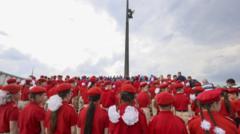In the occupied regions of Ukraine, a controversial campaign led by Russian authorities is underway, focusing on children as a key demographic for fostering allegiance to Russia. At nursery schools across places like Luhansk, children are seen proudly waving a distinctive black and orange military banner, while they chant songs praising their Russian identity amid performances staged around the Russian flag.
In Anthracite, local nursery school attendees participate in crafting trench candles and blankets for Russian troops, marking just one facet of a larger strategy aimed at dismantling Ukrainian national pride and instigating disillusionment among the youth regarding their own culture. With a significant number of Ukrainian educators having fled, Moscow has incentivized Russian teachers to move into occupied areas by offering substantial financial packages to promote the new curriculum.
Central to this campaign is "Yunarmia," Russia's youth military organization, which is rapidly expanding its operations in these occupied territories. Aimed at children as young as eight, Yunarmia not only provides basic military training but also serves as a tool for ideological indoctrination, promoting a narrative that paints Ukrainian history as a construct designed to undermine Russia.
The European Union has condemned Yunarmia, imposing sanctions on the organization, citing its role in the "militarisation" of children. In parallel, other Russian state-sponsored initiatives, like "Movement of the First Ones" and "Warrior," are being implemented to offer military training and patriotic education aligned with Kremlin strategies. Events reminiscent of Soviet-era traditions are being orchestrated, where children are expected to display military competencies.
Within the educational framework, children are subjected to a curriculum that uses Russian textbooks, often containing provocatively skewed portrayals of Ukrainian identity and historical context. One former student recounts enforced participation in state celebrations, where the allegiance to Russia was mandatory, reinforcing the ideological shift imposed on them.
Moreover, Russian soldiers are actively participating in this indoctrination process, delivering "bravery lessons" that glorify military exploits while dehumanizing Ukrainian forces. Schools are transformed into venues for propagandistic exhibitions, aiming to reshape the narrative around the ongoing conflict.
Russia has extended its reach beyond educational propaganda to actual physical displacement, leading to situations where thousands of Ukrainian children are ferried to Russia under the guise of cultural integration programs. Estimates indicate that around 19,000 children have been forcibly relocated, with allegations of their placement in "re-education camps."
Such tactics raise serious concerns regarding violations of international humanitarian law. The Fourth Geneva Convention explicitly forbids enlistment of children in occupied territories and any manipulative pressure for such enlistment. The International Criminal Court has called for accountability against President Putin for these unlawful actions.
Russia's efforts in Ukraine, therefore, are not limited to seizing land—they also encompass an ambitious plan to reshape the loyalties and identities of those living within its new borders, especially the youngest citizens.


















